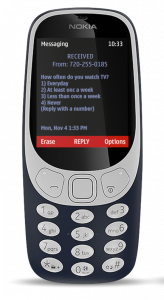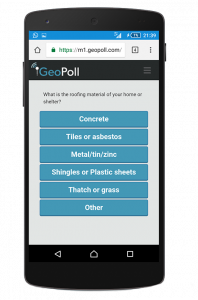 Surveys are one of the most common forms of data collection around the world. With the help of numerous templates and questionnaire examples available online, surveys are relatively simple to design and set up, and are used across industries. Surveys are behind many of our most well-known data sources, including census data, approval ratings, political polling, and customer satisfaction metrics. They support many question types and can gather a range of data points, including multiple-choice, ranking, open-ended, matrix ratings and select-all-that-apply, and can collect both quantitative data and qualitative data (by analyzing open-ended responses).
Surveys are one of the most common forms of data collection around the world. With the help of numerous templates and questionnaire examples available online, surveys are relatively simple to design and set up, and are used across industries. Surveys are behind many of our most well-known data sources, including census data, approval ratings, political polling, and customer satisfaction metrics. They support many question types and can gather a range of data points, including multiple-choice, ranking, open-ended, matrix ratings and select-all-that-apply, and can collect both quantitative data and qualitative data (by analyzing open-ended responses).
Surveys are useful for collecting data that quickly provide conclusive answers to research questions such as, “What products would my customers like to see from my brand next?” If 65% of surveyed consumers say they would purchase jeans over t-shirts, looking into denim production would be a good bet for the company.
Survey data can also be easily cross-tabulated to provide more in-depth data on certain segments of a population. For example, by comparing results by gender you may find that 80% of females would purchase jeans, whereas only 50% of men would purchase jeans from your brand and 50% would prefer you produce t-shirts.
The popularity of surveys is also undoubtedly due to the ease in which they can be deployed, especially in areas where Internet and phone usage is high. Brands often implement post-purchase surveys directly on their website, or email survey links to customer lists. Studies that require random samples can be conducted by automated phone dialers, which is a method used regularly by political polling firms. Using these methods, researchers can often collect a representative sample within hours or days.
Methods for Collecting Survey Data in Africa
However, conducting surveys in areas that have low Internet or phone penetration can be much more difficult. Collecting survey data from countries in Africa, which have very low landline usage and unreliable Internet connectivity, can take much longer, and researchers may have to use older and more manual methods of data collection. The most common methods for collecting survey data in Africa include:
- Face to Face Surveys: Face to face surveys, also known as in-person surveys, require an interviewer to travel to their survey subject – this may mean going door-to-door to find people willing to take a survey, which in some areas can be a challenge due to lack of infrastructure and long distances between houses. Face to face survey answers can be recorded in several ways, including:
- Pen and Paper: As the name implies, these surveys are those where questions are read and responses recorded via pen and paper. Survey data collected in this way is often subject to human error and data loss or damage, as wrong answers may be selected during the survey, and paper sheets could be lost or torn. This method requires a researcher to input data into a system for analyzing, which can introduce another layer of human error.
- Computer Assisted Personal Interviewing: CAPI surveys still require an interviewer to read through survey questions and record answers, but the recording is done digitally via a tablet or phone which has questions and answer options loaded onto it via survey software. This method reduces the chance for data loss or damage, and data can automatically be compiled, eliminating the need for a researcher to go through and record all survey answers once they have been collected.
- Surveys via Mobile Phone: Although landline penetration is low in Africa (roughly 0.46% in Kenya, 7.24% in South Africa, and 0.28% in Nigeria), mobile phone usage has grown. In countries such as Kenya, which has 86 mobile subscriptions for every 100 people, and South Africa, which has 162 mobile subscriptions for every 100 people, mobile is a viable mode to collect survey data in Africa. There are several modes which can be utilized to conduct surveys via mobile:

- SMS Surveys: SMS or text message surveys are surveys administered via 2-way textmessage conversation, in which a question is sent to a mobile phone number, and an answer typed in is sent back as a response. SMS surveys are useful for collecting survey data in Africa due to the ubiquity of SMS (all phones have basic SMS capabilities) and the ability for messages to be sent even if phones are turned off or do not have service when the message is sent. The questionnaire length for SMS surveys should be kept quite short, and each question and corresponding answers need to stay within 160 characters to avoid being truncated awkwardly. How SMS surveys are administered in Africa can differ by country – learn more about how GeoPoll’s SMS surveys work here.

- Mobile Web Surveys: Mobile web surveys are link-based surveys that can be viewed in a basic mobilebrowser. A survey link can be shared via email, text message, or through social media, and will open a mobile browser which contains the survey content. Mobile web surveys can include longer question and answer options as there is not a character limit, however, it is still recommended that the number of total questions is kept to under 20.
- Computer Assisted Telephone Interviewing Surveys: CATI surveys are administered via an interviewer calling a mobile phone number and reading through survey content from a remote call center. These surveys do not have a character limit and can be slightly longer than SMS or mobile web surveys as they are not self-administered. Survey responses are typically recorded via CATI software used by the interviewer. These surveys require that call center employees are trained on how to administer surveys correctly, however, can be administered to populations with low literacy rates.
- Interactive Voice Response Surveys: IVR surveys are pre-recorded surveys conducted via automated voice call. Respondents key in answers on their phone keypads. IVR surveys can be sent to large numbers of respondents at once as they do not require call center interviewers, but tend to have low response rates due to their automated, pre-recorded nature.
- SMS Surveys: SMS or text message surveys are surveys administered via 2-way textmessage conversation, in which a question is sent to a mobile phone number, and an answer typed in is sent back as a response. SMS surveys are useful for collecting survey data in Africa due to the ubiquity of SMS (all phones have basic SMS capabilities) and the ability for messages to be sent even if phones are turned off or do not have service when the message is sent. The questionnaire length for SMS surveys should be kept quite short, and each question and corresponding answers need to stay within 160 characters to avoid being truncated awkwardly. How SMS surveys are administered in Africa can differ by country – learn more about how GeoPoll’s SMS surveys work here.
- Online Surveys: Surveys can be conducted online in Africa via online survey software, but due to low desktop computer and Internet penetration rates in Africa respondents are often not representative of an entire population. These surveys can be sent out via email to a targeted list, or respondents can be recruited through social media or other types of online advertising. You should keep in mind that even if a survey is sent via an email link, it is very likely to be opened on a mobile phone rather than a desktop browser. Therefore, when using online survey solutions for collecting survey data in Africa, you should verify that questions show up as expected on a mobile device.
How You Should Collect Survey Data in Africa
 The “best” way to collect survey data in Africa depends on many factors, including your research goals, target audience, budget, and timeline. For those looking to collect data that is representative of a large portion of the population quickly and cost-effectively, SMS or mobile web are the best methods. Online surveys are very cost-effective and can be used to reach wealthier populations rapidly. CATI surveys are useful for gathering data from a population with low literacy rates, or when you are looking to conduct a longer survey. Face-to-face surveys can reach any population, including the lowest economic classes, however require a significant investment in both time and money. If conducting surveys via face to face methods, we recommend utilizing a trusted vendor such as GeoPoll who uses proprietary CAPI software to track survey completion rates and data quality while surveys are in the field.
The “best” way to collect survey data in Africa depends on many factors, including your research goals, target audience, budget, and timeline. For those looking to collect data that is representative of a large portion of the population quickly and cost-effectively, SMS or mobile web are the best methods. Online surveys are very cost-effective and can be used to reach wealthier populations rapidly. CATI surveys are useful for gathering data from a population with low literacy rates, or when you are looking to conduct a longer survey. Face-to-face surveys can reach any population, including the lowest economic classes, however require a significant investment in both time and money. If conducting surveys via face to face methods, we recommend utilizing a trusted vendor such as GeoPoll who uses proprietary CAPI software to track survey completion rates and data quality while surveys are in the field.
No matter how you collect survey data in Africa, we recommend speaking to someone who has experience in conducting surveys in the countries you are working in. GeoPoll has experience collecting survey data in over 30 countries in Africa and can assist with survey design, sample acquisition through our respondent database, survey implementation, and data analysis. For advice on the best way to collect survey data for your project, download our full guide on conducting research in emerging markets or contact us today.




